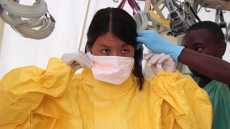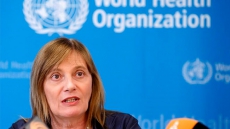HALIFAX - The lead researcher of a new study is calling for improvements to some of Canada's waste water treatment facilities after finding that introducing the birth control pill in waterways created a chain reaction in a lake ecosystem that nearly wiped out a freshwater fish.
The study, which is being published in Philosophical Transactions of the Royal Society B on Monday, found that introducing small amounts of estrogen into a lake led to the near extinction of the fathead minnow because it interfered with the fish's ability to reproduce.
Lead researcher Karen Kidd of the University of New Brunswick said the study has been ongoing since the late 1990s, when researchers in the United Kingdom discovered that male fish began to develop eggs when estrogen was introduced in their habitat.
Kidd said their study set out to build on that research to determine whether the estrogen would effect the fathead minnow's ability to reproduce and whether there were larger effects on the lake's ecosystem.
Reseachers started introducing small amounts of estrogen into an Ontario freshwater lake research facility in 2001, Kidd said.
"Right away, the male fish started to respond to the estrogen exposure by producing egg yolk proteins and shortly after that they started to develop eggs," she said in an interview from Saint John, N.B. "They were being feminized."
Kidd said shortly after introducing the estrogen, the number of fathead minnow crashed, reducing numbers to just one per cent of the population.
"It was really unexpected that they would react so quickly and so dramatically," she said. "The crash in the population was very evident and very dramatic and very rapid and related directly to the estrogen addition."
Kidd said that created a domino effect, causing the population of lake trout, the fathead minnow's main predator, to decline. She said the number of insects, the fathead minnow's main source of food, also started to increase.
There are several areas in Canada that have feminized male fish because of municipal water sewage being released into waterways, Kidd said, including in Wascana Creek in Saskatchewan, the Grand River in southwest Ontario and the South Saskatchewan River in southern Alberta.
"It's a problem that we can certainly resolve with better waste water treatment," she said.
The good news is that after removing the estrogen, the fathead minnow population recovered back to what it was before the research began, said Kidd.
"It's evidence that removing these chemicals from our effluents will have downstream benefits for the fish population," she said.
The research facility where the study was conducted, the Experimental Lakes Area, has been the subject of some controversy over the past few years after the federal government announced it was considering closing it to save $2 million annually. The Ontario and federal governments later came to an agreement to keep the facility open.
Kidd said this is the kind of work that validates the facility. She said the larger effects on the ecosystem likely wouldn't have been detected if the study was conducted in an uncontrolled environment because of the challenges associated with it.
"We wouldn't have even looked for those other downstream impacts," said Kidd. "(The Experimental Lakes Area) is such a powerful way to look at how the food web responds to a stressor."





